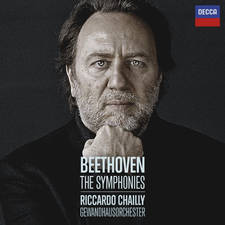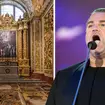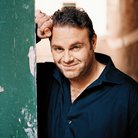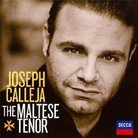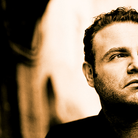Joseph Calleja: Help of Cultural Entrepreneurs like Konstantin Ishkhanov “indispensable”
19 July 2021, 09:38 | Updated: 19 July 2021, 09:58
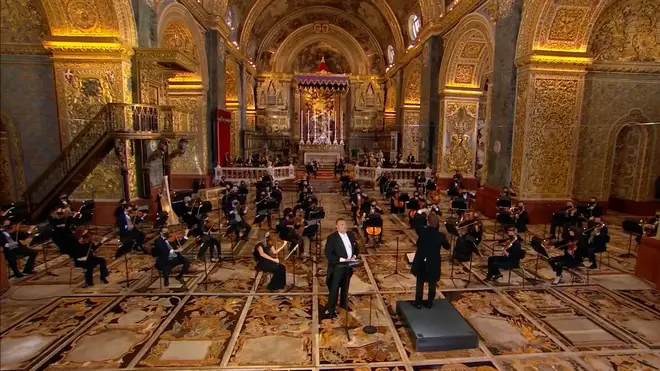
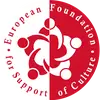 Promoted by European Foundation for Support of Culture
Promoted by European Foundation for Support of Culture
The star tenor opens up about the magic of music and the importance of live performances during this time of disruption and loss.
On 30th of March this year, Malta’s best loved son, Joseph Calleja, performed with the Malta Philharmonic Orchestra under the baton of Ramon Tabar, along with a host of international artists.
Organised by the European Foundation for the Support of Culture (EUFSC) and the BOV Joseph Calleja Foundation, the concert saw the world-acclaimed tenor perform alongside an impressive operatic line-up that included Sondra Rodvanoski (Soprano), Marvic Monreal (Mezzo) and Christian Van Horn (Baritone). The event was streamed live on Classic FM on Tuesday 1st April and was transmitted locally on 2nd April (Good Friday).
Watch: Joseph Calleja’s star-studded sacred concert from Malta
We caught up with Joseph to find out more about this concert, his love of music, his experiences as a performer during the coronavirus pandemic and why the artistic world needs support more than ever before.
The last year has of course been very challenging for arts and culture sectors across the world. How did the COVID -19 pandemic impact your activities?
Obviously, the virus situation has decimated all concerts and bookings, but it has also impacted psychologically because, as artists, we miss performing for our audiences. These are unprecedented times but, whilst I fully understand the seriousness of the situation and that people have lost loved ones, the fact is, and the experts confirm this, these lockdowns are just not sustainable in the long-term. Who wants to live like this on a permanent or quasi-permanent basis? This is not the first time that Mankind has faced such challenges and our own mortality. We need to do whatever it takes — be it vaccines, mask-wearing or whatever else must be done — to find a way back to normality.
For the concert in March, you performed alongside the MPO and other opera performers in a filmed concert featuring a selection of popular Arias. Have you worked with these performers in the past before then?
I have worked with all of them. Sondra Rodvanovski is one of the top sopranos in the world, Christian Van Horn has a fantastic Baritone voice and Marvic Monreal is one of the scholars of my foundation in Malta. It is a beautiful programme and very apt for the venue of St. John’s Co Cathedral and the times we are living through — in fact, that concert was dedicated to the victims of the coronavirus. I personally know people in the Metropolitan Opera who succumbed to the virus. I think we all know someone who has.
The first work in the performance was Verdi’s Requiem. How did you go about staging what can only be described as an epic piece of work during this time?
Although we recorded excerpts from Verdi’s Requiem, unfortunately we had to do so without choir to avoid another seventy people being present. In terms of the piece itself, the Requiem is written in a very operatic fashion and is, first and foremost, a work of opera. I challenge anyone to listen to it and not be moved emotionally.
The programme also contained the well-known song, Amazing Grace. What inspires you to perform works outside of the operatic canon?
I believe music is music, and that if it suits your voice you should perform it. I’m not a pioneer in this. The operatic aficionado, Tito Schipa, did it. He used to sing South American folk songs and even recorded them at his house in South America. They were the equivalent of the pop songs of today, for that time. In my opinion, if it sounds great sung in an operatic voice, then why not do it? In my latest album, The Magic of Mantovani, I performed Frank Sinatra’s Strangers in the night. Certain songs lend themselves to being sung in an operatic voice if your diction is good enough. It surprised a lot of people, but overall, it was well received.
How do you feel online performances can benefit people in a situation such as we are now facing?
Nothing can replace the live experience of the music, the orchestra and the voice. We are made to sing in theatres and concert halls, but when these venues are temporarily unavailable then online performance is the only solution. It is a very poor substitute, but it is a substitute nonetheless!
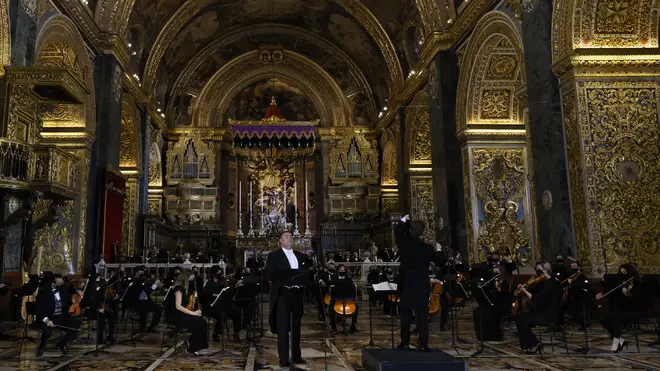
In 2019 you performed in Russia with the MPO on a tour entitled “A Union Of Cultures”. The same year you were quoted as saying, “Moscow has the warmest audiences!” Do you feel there is a particular appreciation for classical music in Russia, and opera in particular?
I really believe you can gauge a people by the way they react in a concert. It’s not the first time I’ve seen a Moscow audience visibly moved, sometimes to tears. I think it is something very beautiful to behold when we, as human beings, allow our emotions to surface without fear of judgement or ridicule. That is what music is all about in my opinion: to provoke a reaction from the human soul. That is why we perform.
What is your opinion of the work of the organisations and cultural entrepreneurs who are behind such projects and initiatives? How do you see their role in the cultural world of today?
We need more people who are passionate about the arts like the members of the European Foundation for Support of Culture and its President, Konstantin Ishkhanov. In Konstantin’s case he is witnessing the arts from both sides — through his son’s artistic development [as a pianist] as well as from the point of view of a philanthropist. The arts need support from people like him because, quite frankly, the help of patrons has now become indispensable.
Since 2012 you have served as Malta’s official and first ever Cultural Ambassador. How do you now see your role in what is arguably a more polarised world than ever before?
If you are an artist, you can’t help but become political but we need to exercise care as we arguably live in what might be described as a ‘cancel culture’. The truth is, we talk about freedom of expression, but if someone’s views go against the established norm, one can find themselves ‘cancelled out’, stonewalled. It can make life very difficult, especially in the current political climate, as you can find yourself out of favour for the most ridiculous reasons.
I think art can be very political but, in reality, it should be the politics that unite us. I often think of the late Judge Ruth Bader Ginsburg, who I had the pleasure of meeting and who was a guest at my house. She advocated disagreeing in a diplomatic way when you have a difference of opinion with someone. The politics of confrontation cause only that — confrontation, and ultimately gets us nowhere.
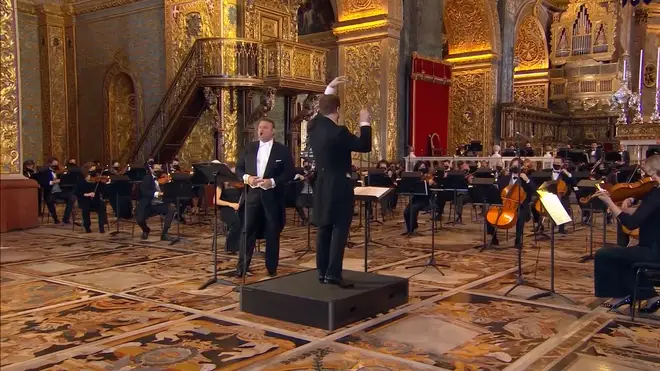
You are heavily involved with philanthropy through both the BOV Joseph Calleja Foundation and Drake Calleja Trust. What are you most proud of in terms of these ventures?
Quite simply, it’s a case of doing good for the sake of doing good. It’s as simple as that. The BOV Joseph Calleja foundation is currently helping more than seventy scholars and children with special needs, as well as sponsoring cultural programmes, while the Drake Calleja Foundation funds overseas students studying in the UK. I think giving someone an opportunity that can change their lives for the better is an incredibly humbling experience. All the money we receive goes directly to those who need it. Our patrons know this and that is why they continue their association with us. When you meet people like that you need to appreciate them.
Last December you worked with the MPO and conductor and pianist, Gianluca Marciano, along with sopranos Carly Paoli and Carmen Giannattasio, to produce a TV special combining music and videos of famous landmarks in Malta. Where did the inspiration for this programme come from?
It came from a refusal to just sit at home and accept the situation. I found out there was a lot of filming still going on in Malta, and thought that if it can be done with film projects then it can be done with music. So, we ‘got on with it’, as it were, and decided to go ahead with the recording, which will be broadcast through streaming. I did the same with my latest album The Magic of Mantovani, which has now been picked up by Sky Arts and will be later shown in the US. It was the same case for this latest concert, which was streamed on Classic FM on 1st April and was aired locally on 2nd April. The truth is, we need to make music. We work within the same parameters as the film industry and safety is paramount. After all, we are opera singers — our voice is our instrument, so if we were to become ill it would truly be a disaster for us. All the necessary precautions were taken but I’m a great believer that the show must go on. We came up with the initiative in the absence of being able to perform in front of a live audience.
You usually perform annually in August with the MPO, inviting other world-renowned artists such as Andrea Bocelli. Can you share any information about your upcoming plans for this project and your other performances?
There’s a lot going on: for my part, I have Tosca in Madrid and concerts in Russia and Germany. As for the August concert, the framework is already in place. Hopefully these performances will not be cancelled. At the end of the day, the world has to keep on spinning, but there can be no denying the economic fallout from his situation — which is already devastating and will only worsen the longer the situation goes on. We need a paradigm shift in the thinking of world leaders to get things moving again. Nothing is easy. There are no right choices in this situation although, in terms of Malta, I think overall we have handled the situation very well.
